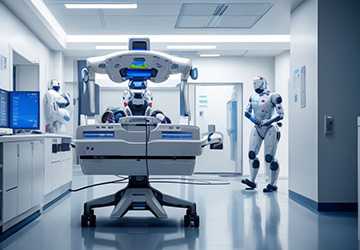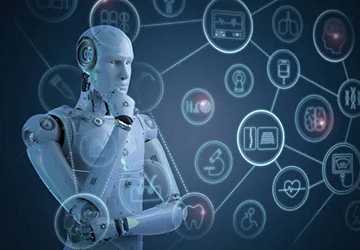The Role Of AI in Healthcare
Artificial intelligence radically transforms the healthcare industry, changing everything from patient diagnosis to treatment planning. Imagine a world where medical professionals can predict illnesses before they strike or tailor treatments precisely to an individual's genetic makeup. That's the reality AI is helping us create. AI is enhancing healthcare by improving efficiency, precision, and personalization. Intelligent algorithms analyze medical images with extraordinary accuracy, while virtual health assistants support patients throughout their care journeys.

The global healthcare AI market is expected to reach $188 billion by 2030, with a CAGR of 37% from 2022 to 2030. Around a fifth of healthcare organizations have already adopted AI models for their healthcare solutions. Let's explore how AI will transform healthcare in 2024 and what it means for patients and providers.
Relevance of AI to healthcare
Enhancing Data Analysis and Diagnosis
AI involves using machines to mimic human intelligence, a concept that holds transformative potential for healthcare. AI algorithms can use patient records, medical images, and research studies to identify patterns and correlations that might elude human analysts. The role of AI in healthcare diagnostics is vast. It allows doctors to make more informed decisions, leading to faster and more accurate diagnoses.
Advancing Predictive Analysis and Personalized Care
AI improves predictive analytics, enabling healthcare providers to foresee patient outcomes based on historical data and current health indicators. For instance, trained models can predict the likelihood of disease progression in chronic illness patients, allowing for early intervention and personalized treatment plans. AI's ability to process and analyze data at such a scale significantly improves the precision of medical research, facilitating the discovery of new treatments and therapies.
Real-Time Clinical Decision-Making
In clinical settings, AI-powered tools assist with real-time decision-making. AI systems can provide surgeons with enhanced visualizations and critical insights during surgeries, improving surgical precision and patient safety. Additionally, AI aids in managing and interpreting genetic information, which is pivotal in the growing field of genomics. By analyzing genetic data, AI helps identify genetic predispositions to certain diseases, enabling preventive care and personalized medicine.
Applications of AI in Healthcare
Diagnostic and Imaging Tools
AI excels in medical imaging. Algorithms analyze X-rays, MRIs, and CT scans with superhuman accuracy. For instance, Google's DeepMind can diagnose eye diseases as accurately as the world's top specialists. AI identifies anomalies that human eyes could overlook, resulting in earlier and more precise diagnoses.
Personalized Medicine
AI enables personalized medicine by analyzing genetic information. Companies like 23andMe and AncestryDNA use AI to offer genetic insights. Doctors can now tailor treatments to a patient's genetic profile, improving efficacy and reducing side effects. Predictive analytics also help create personalized care plans and enhance patient outcomes.
Virtual Health Assistants
AI-driven chatbots and virtual health assistants are becoming common. These tools answer patient queries, schedule appointments, and provide health advice. For example, Babylon Health’s AI can diagnose illnesses based on patient symptoms, improving accessibility and convenience.
Benefits of using AI in Healthcare
Cost Reduction
AI significantly lowers healthcare costs by automating routine tasks and handling repetitive administrative duties like appointment scheduling, billing, and patient record management. According to a study by Accenture, AI applications could save the U.S. healthcare industry up to $150 billion annually by 2026. Additionally, AI reduces human errors in medical documentation and data entry, which are familiar sources of financial loss in healthcare institutions. These systems ensure that healthcare providers make informed, data-driven decisions, reducing unnecessary tests and procedures, thus further cutting costs and enhancing overall operational efficiency.
Remote Patient Monitoring
AI enables remote patient monitoring and telemedicine, allowing healthcare providers to deliver care to patients outside traditional clinical settings. Wearable devices with AI algorithms can monitor patients' vital signs, activity levels, and medication adherence in real-time, transmitting data to healthcare providers for remote monitoring and intervention. These advancements highlight the benefits of AI in patient care and healthcare management.

AI-powered telemedicine platforms enable virtual consultations, remote diagnostics, and patient education, thereby expanding access to healthcare services.
Challenges and Ethical Considerations
Data Privacy And Security Concerns
AI depends on large datasets, which raises significant privacy and security issues. Protecting patient data is essential, requiring healthcare providers to comply with stringent regulations such as HIPAA to ensure data security.
Biases in AI Algorithms
AI algorithms can perpetuate biases if trained on skewed or incomplete datasets. For example, if a facial recognition algorithm is trained predominantly on images of lighter-skinned individuals, it may struggle to identify darker-skinned individuals, leading to discriminatory outcomes accurately. Similarly, healthcare AI algorithms trained on data from predominantly affluent or homogeneous populations may not accurately represent the diverse range of patients encountered in clinical practice.
Patient Consent And Autonomy
AI-driven healthcare interventions impact patients' autonomy and control over their healthcare decisions.
Future Trends and Innovations
AI-Driven Drug Discovery
Recent advancements in AI have revolutionized the drug discovery process by enabling researchers to explore novel avenues for medication development. One exciting area of research involves the knowledge of deep learning algorithms to predict the structure of proteins, a crucial step in understanding how drugs interact with their targets in the body.
Furthermore, AI-powered molecular simulations optimize drug candidates by predicting their pharmacokinetic properties and potential side effects, leading to safer and more efficacious therapies.
Medical Robots
Integrating medical robotics with AI functionalities reshapes surgical practices and patient care delivery across various specialities. A significant advancement is using robotic-assisted systems in minimally invasive procedures, including both laparoscopic and robotic-enhanced laparoscopic surgeries.
Conclusion
In conclusion, integrating artificial intelligence into healthcare revolutionizes patient care and medical innovation. As AI-powered technologies advance, they offer transformative solutions to longstanding challenges. However, alongside these advancements come ethical considerations that must be navigated to ensure patient privacy and fairness. By embracing AI while addressing these challenges, healthcare benefits from more intelligent, efficient practices that ultimately improve patient outcomes and advance the field.